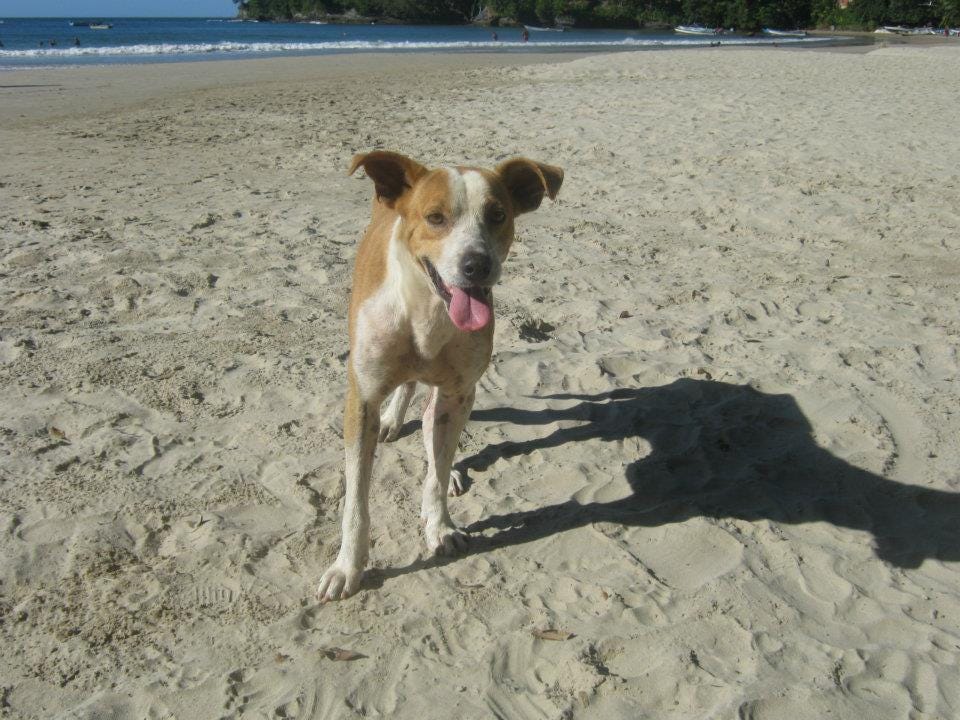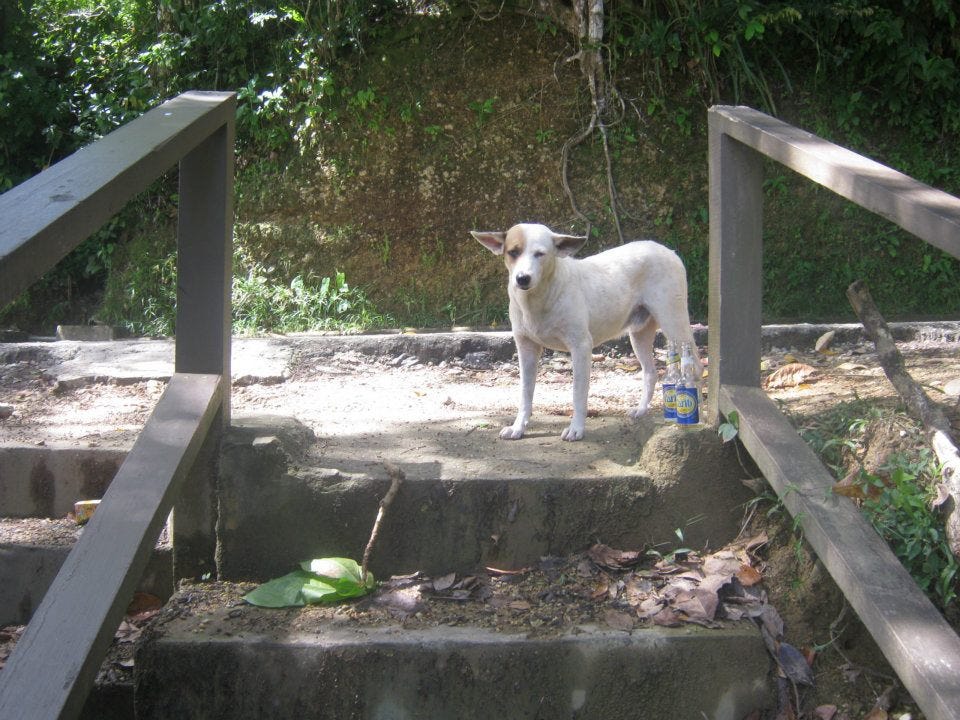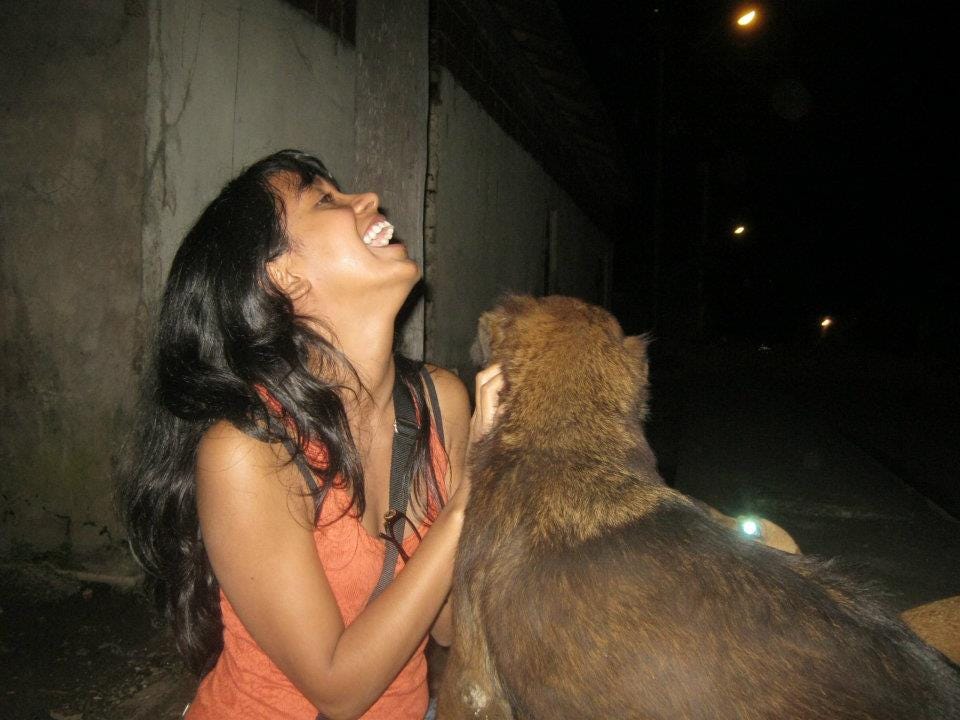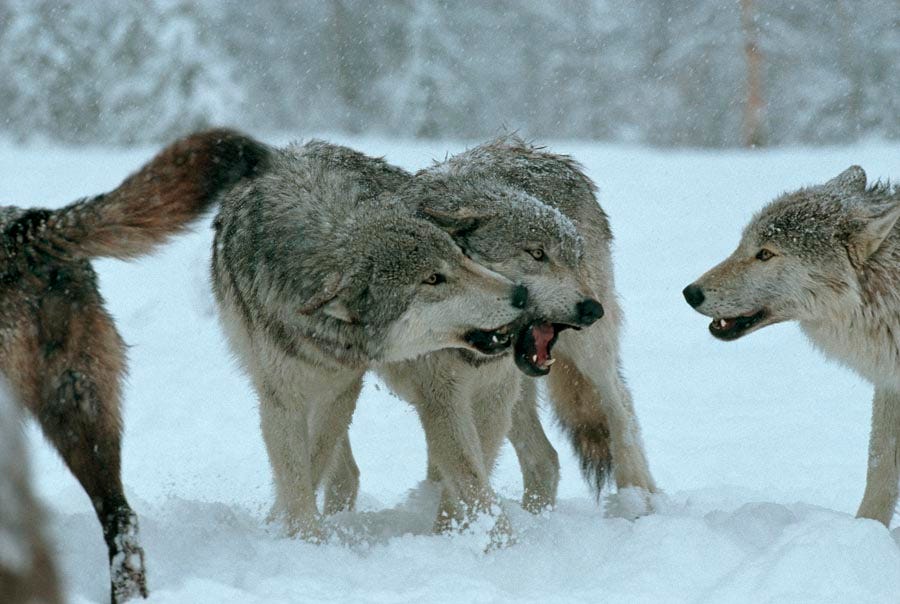What the Wild Dogs Taught Me
On Telepathy, Freedom, and the Domestication of Humans
In a recent conversation with a coworker, I was reminded of how differently we all see the world.
We got to talking about “cats versus dogs” — a popular topic of debate. Are you a cat person or a dog person?
I told her that while I appreciate cats, I am ultimately a dog person.
She looked flummoxed.
“Why?” she said. “They’re so needy! And they get all up in your personal space! And having a dog is like having a baby — they can’t do anything on their own! Your whole life has to revolve around them!”
And then she said the thing that stung: “And they’re so submissive!”
That’s when it occurred to me, for the thousandth time:
I have not known “dogs” the way most people know “dogs.”
The dogs I knew as a kid, were Wild.
I spent a good amount of time in Trinidad growing up. How much time exactly, I don’t know. In reality it was probably only a few weeks every summer — but when you’re a kid, being away from home for any length of time feels like an eternity.
That is to say, my sense of how much time I spent in Trinidad (my mom’s home country) is warped. Despite being born and raised in the States, and despite having spent equal time in Puerto Rico (with my dad’s side of the family), Trinidad shaped my personality in a way that other places didn’t…
…by way of its dogs.
Trinidad is an island in the Caribbean, considered by some authorities to be “third world.” That’s certainly true of the village where my mom’s family lives. There’s a severe lack of structure about everything.
Literally, many of the homes are ramshackle sheds. The roads are dirt, winding, no signs or stoplights. People can just walk into your house and decide it’s theirs — which happened to my grandma twice.
Culturally, there’s almost no sense of “time” there. One moment bleeds into the next. One day into another.
And one effect of all this structurelessness, is that stray dogs roam everywhere.
These dogs don’t really “belong” to anyone. Some people feed them. Other people beat them away with brooms made of straw. Mostly, they’re left to fend for themselves. They still know how to hunt for their own food, and fight for their territory. So they survive without needing an “owner.”
Generally, the cultural perception of these feral dogs is that they’re dirty pests — a nuisance. Maybe even dangerous.
So you can imagine how much my family would freak the fuck out when I’d gleefully pet all the local strays, unbothered by their warnings about “mange” and “germs.”
My Trini family couldn’t wrap their heads around why I liked being around these dogs.
Even more confusing to them, was the fact that the dogs liked to be around me, too.
Picture this: Me, maybe 6 or 7 years young, a pipsqueak. Constantly bullied by my cousins.
Picture me surrounded by feral dogs: lounging on either side of me while I rubbed their dusty bellies, and viciously snapping at every other member of my family.
These were dogs who were often covered in scabs from life on the streets, and would sometimes come to me limping or bleeding after a dogfight. These were dogs who knew what it meant to fight for their lives.
Here they were, trusting me.
To say I felt “protected” would be an understatement. I was family to them.
It was never a mystery to me, why the dogs would come to me. I just intuitively understood their Wildness:
If you didn’t respect them, they wouldn’t respect you.
If you tried to hurt them, they’d bite you back.
If you mistreated them, they’d run away and never return. No hesitation.
If you tried to “teach them tricks,” they’d despise you.
You could never force these dogs to be your “pet.” Either they liked you enough to seek you out of their own free will, or they didn’t — in which case, you’d never see them again.
They knew they were wild.
They knew they were free.
They were nothing like the “needy, babyish, submissive” domestic dogs we have here in the States — the ones who “must” be put on a leash according to ThE LaW, and need constant care.
Nah.
These were Wolves.
If they wanted to come to you, they’d come to you.
And come to me, they did!
My family couldn’t make sense of it, but eventually they accepted that I was a “dog whisperer” and would have a puppy waiting for me every time I visited Trinidad.
One of “my” puppies was named Twinkle (and I hesitate to even call him “mine” because he could have run away any time he wanted — the door was always open — yet he chose to stay).
One day, while my Grandma was sweeping, Twinkle kept getting underfoot and play-attacking the broom. So she asked me to “tie him up” just long enough for her to finish sweeping.
I had never “tied up” a dog before, so I found some string and did my best to fashion a makeshift leash around Twinkle’s neck, not too loose, not too tight.
Twinkle panicked.
He yelped. He screeched. He desperately thrashed around and tried to tear the string from his neck, to no avail.
I almost cried, watching him try to make sense of this strange device that was preventing him from freely exploring his world. I tried to explain to him that it was only for a few minutes, but my wild baby was still terrified.
It still makes me cry to remember that moment. The medicine of it. He was teaching me something I didn’t know I’d ever need.
Imagine being so wild and so free,
that being put on a leash
— to have your freedom restricted —
even for a few minutes
is too terrifying to comprehend
and too awful to accept.
Imagine…
When I talk about the Wild Dogs in Trinidad, some people can’t imagine being a dog’s caretaker and not teaching it at least a few tricks. They’ve accepted the premise that dogs “need” training, or even “thrive” on it — and that if they aren’t “taught their place” in the “hierarchy” or “pack,” they’ll psychologically suffer.
Well, I’m here to tell you that’s not true.
Not even a little bit:
Years after Twinkle, I “had” another puppy named Hazel. This girl was feistyyyy, let me tell you! She hated being told what to do — which is funny, because the only time I ever told her what to do was when she went wandering under the house among broken glass and splintered wood, so I told her to come back before she gets hurt.
Have you ever had a dog “talk back” to you? Because Hazel definitely talked back to me that day (and I’m sure I heard some expletives in there).
One time, my Grandma made curry shrimp. The family sat around eating. Hazel wanted some, so — as was her feisty way — she started barking at me to give her some.
I remember thinking to her, You don’t need to make so much noise to get fed. Grandma is going to get mad, so can you please just sit quietly? I’ll happily share my shrimp with you.
Then I telepathically sent her a mental image of her, sitting quietly.
She immediately stopped barking and sat down.
Then I threw her some shrimp, and she ate.
I didn’t “teach her a trick.” I didn’t “Pavlov” her to associate a treat with a behavior, nor did I give her commands to amuse myself, or flex my authority over her.
I simply explained — telepathically, which is as much her language as it is mine — that I needed her cooperation… and from that moment forward, she no longer barked for food. She simply requested it, and I gave it to her.
People think dogs need to be “tricked” into behaving “correctly” with treats (which they stop receiving after successfully learning the trick… which is deceptive and takes advantage of their trust… so for that reason alone, I hate it).
Frankly, it disgusts me when people treat their dogs like automatons who exist simply to obey commands.
Why is it culturally acceptable to treat them like slaves? If you were in a relationship with a person like that, you’d call that person abusive!
Pro-tip: You can talk to dogs the way you’d talk to any person. Just with telepathy.
Instead of approaching their wildness as something to control and correct, why not approach it with honor and reverence?
Instead of “training” a dog to do what you want them to do, why not take their feelings and desires into consideration?
And instead of telling them what to do, why not just ask them to cooperate?
If you start telepathically explaining to dogs why you want them to do XYZ, don’t be surprised when they happily do it.
It’s not because they “need” to be trained, but because they appreciate when their freedom is recognized and respected.
Wouldn’t you?
When I think of dogs, I don’t think “loyal,” “well-behaved” or even “friendly.”
I think: Independence. Autonomy. Honor. Dignity. Power.
Wildness.
And I’ll be honest:
The Wild Dogs in Trinidad gave me a bit of a “Wolf Complex.”
I know that I’m expected to act docile, submissive, obedient… but I don’t.
Because I know I’m sovereign. I gno Who I Am.
And for that, I can’t bring myself to dishonor the freedom of my animal brothers and sisters.
That’s why it’s so funny to me when “dog people” are accused of “wanting a submissive pet that they can dominate” (as if “cat people” never have complexes, LOL),
because I am a “dog person” — but I have never taught a dog a trick, and never will.
I refuse to make a Wild Being beg for food.
I refuse to make a Wild Being “sit” when they want to run.
I refuse to make a Wild Being “play dead.”
I refuse to humiliate a Wild Being for my own amusement.








What a beautiful meditation on freedom vs. domestication and interspecies bonding 💞
Two relevant gems from Mary Oliver’s “Dog Songs: Poems”:
“Because of the dog’s joyfulness, our own is increased. It is no small gift. It is not the least reason why we should honor as well as love the dog of our own life, and the dog down the street, and all the dogs not yet born. What would the world be like without music or rivers or the green and tender grass? What would this world be like without dogs?”
“You’re like a little wild thing
that was never sent to school.”
I’m neither a cat person nor a dog person but I’m certainly an Alicen Grey person! Thank you for this wonderful post. I’m afraid I’ve been denying my wild side much too long! It’s time to start breaking some rules . . . and my leash!